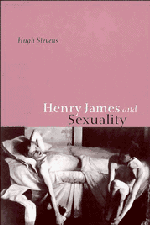Book contents
- Frontmatter
- Contents
- Preface
- Acknowledgements
- List of abbreviations
- 1 Henry James and the languages of sex
- 2 Gender and representation in The Wings of the Dove
- 3 Sexuality and the aesthetic in The Golden Bowl
- 4 The eroticism of prohibition: masochism and the law in Roderick Hudson
- 5 Queer plotting: The Bostonians and The Princess Casamassima
- 6 James's late short fiction and the spectacle of modern homosexuality
- 7 Suicide and blackmail: James's ‘poor sensitive gentlemen’
- Conclusion: ‘that queer monster the artist’
- Notes
- Bibliography
- Index
4 - The eroticism of prohibition: masochism and the law in Roderick Hudson
Published online by Cambridge University Press: 28 October 2009
- Frontmatter
- Contents
- Preface
- Acknowledgements
- List of abbreviations
- 1 Henry James and the languages of sex
- 2 Gender and representation in The Wings of the Dove
- 3 Sexuality and the aesthetic in The Golden Bowl
- 4 The eroticism of prohibition: masochism and the law in Roderick Hudson
- 5 Queer plotting: The Bostonians and The Princess Casamassima
- 6 James's late short fiction and the spectacle of modern homosexuality
- 7 Suicide and blackmail: James's ‘poor sensitive gentlemen’
- Conclusion: ‘that queer monster the artist’
- Notes
- Bibliography
- Index
Summary
Constructivism needs to take account of the domain of constraints without which a certain living and desiring being cannot make its way. And every such being is constrained by not only what is difficult to imagine, but what remains radically unthinkable: in the domain of sexuality these constraints include the radical unthinkability of desiring otherwise, the radical unendurability of desiring otherwise, the absence of certain desires, the repetitive compulsion of others, the abiding repudiation of some sexual possibilities, panic, obsessional pull, and the nexus of sexuality and pain.’
Judith Butler1 JAMES AND HIS CRITICS
Over the next four chapters I will be discussing fictional texts by James published between 1875 (the date of the American publication of Roderick Hudson) and 1910 (when James's last short story, ‘A Round of Visits’, was published), and showing that James's writing persistently concerns itself with same-sex eroticism, and the relation between same-sex passion and ‘lidentity’. Homoeroticism and the question of homosexual identity are, according to the reading offered here, important in James's writing both before and after the formation of recognizably modern homosexual identities in 1890s Britain and America.
This reading represents a departure from a critical view of James as only exploring homoeroticism and homosexual identity timidly, or views which argue that such themes have a subtextual presence in James's work, but were not necessarily intended by James. Recent readings by critics such as Eve Kosofsky Sedgwick, Wendy Graham, Eric Savoy, Terry Castle and Michael Moon reflect a crucial shift in James studies, which have begun to take seriously his work's engagement with homosexuality.
- Type
- Chapter
- Information
- Henry James and Sexuality , pp. 61 - 89Publisher: Cambridge University PressPrint publication year: 1998



